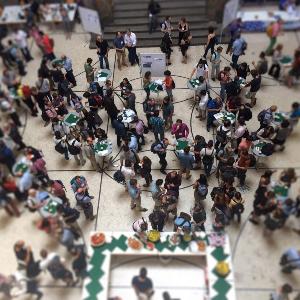Events
Find out what's happening at the MCMP.

Find out what's happening at the MCMP.

The MCMP hosts weekly colloquia on philosophy, logic, philosophy of science, and mathematical philosophy. All those interested in participating can find the default time and location for each colloquium in the table below.
| Colloquium | Standard time | Standard location |
|---|---|---|
| Colloquium in Mathematical Philosophy: Philosophy of Science | Wednesdays, 4 - 6 p.m. and 6 - 8 p.m. | Ludwigstraße 31, ground floor, room 021 |
| Colloquium in Mathematical Philosophy: Logic and Language / Decision Theory | Thursdays 4 - 6 p.m. and 6 - 8 p.m. | Ludwigstraße 31, ground floor, room 021 |
| Work in Progress (WIP) | Thursdays 12 - 2 p.m. | Ludwigstraße 31, ground floor, room 021 |
| PhD Colloquium Chair of Philosophy of Science | varied | Online via Zoom |
We meet in hybrid format every two weeks to discuss a (recent) paper in the philosophy of machine learning, with a focus, but not an exclusive focus, on epistemological topics. The timeslot for the winter semester 2025/26 is Friday 4 - 5 p.m.
If you like to join us, please contact Tom Sterkenburg at tom.sterkenburg@lmu.de or Timo Freiesleben at timo.freiesleben@web.de. The schedule is also online.
This semester we continue to read Carnap's book Logical Syntax of Language (LSS). We will meet weekly to discuss roughly 20 pages of the book. The reading process will focus on the main questions: What role do Carnap's terminology settings play in achieving his epistemological goal? And how does Carnap understand the relation between metalanguage and object-language? We may also bring sections from Carnap's other books such as Meaning and Necessity and the relevant secondary literature into the discussion, but the focus will be on the original text of LSS. No prior knowledge of Carnap’s work is required.
The group will meet online on Fridays, 4 - 6 p.m. If you would like to join, please contact Nata at yangzhwy@outlook.com or Andreas at Andreas.Frenzel@campus.lmu.de.
The MAP reading group meets every two weeks on Friday, from 1 - 2:30 p.m. in room 028. This term, we're reading Katherine Puddifoot's book How Stereotypes Deceive Us in combination with relevant journal articles.
For further information or a Zoom link to join the discussion online, please contact Sophie Kikkert at s.kikkert@lmu.de.
The MCMP strives for a welcoming and friendly atmosphere at all its events and for all participants. We ask that participants in our events be kind to others, and we do not tolerate harassment of participants in any form. Sexual language and imagery is not appropriate for any event venue, including talks.
Harassment includes offensive verbal comments related to gender, gender identity and expression, sexual orientation, disability, physical appearance, body size, race, religion, sexual images in public spaces, deliberate intimidation, stalking, following, harassing photography or recording, sustained disruption of talks or other events, inappropriate physical contact, and unwelcome sexual attention. Participants asked to stop any harassing behavior are expected to comply immediately.
Exception: Discussion or images related to sex, pornography, discriminatory language, or similar is welcome if it meets all of the following criteria: (a) the organizers have specifically granted permission in writing, (b) it is necessary to the topic of discussion and no alternative exists, (c) it is presented in a respectful manner, especially towards women and LGBTQIA people, (d) attendees are warned in advance in the program and respectfully given ample warning and opportunity to leave beforehand. This exception specifically does not allow use of gratuitous sexual images as attention-getting devices or unnecessary examples.
If a participant engages in harassing behavior, the organizers may take any action they deem appropriate, including warning the offender or expulsion from the event with no refund. If you are being harassed, notice that someone else is being harassed, or have any other concerns, please contact a member of the event staff immediately. Event staff will be happy to help participants contact venue security or local law enforcement, provide escorts, or otherwise assist those experiencing harassment to feel safe for the duration of the event.
We expect participants to follow these rules at all event venues and related social events. Some events may have additions to this policy.
This code of conduct is based on the anti-harassment policy developed by the Ada Initiative and other volunteers and is licensed under the Creative Commons Zero license.
Many of the talks and conferences at the MCMP are recorded for our online video archive. In case a talk is recorded we will ask the speaker to authorize the publication of the recording. With this, the speaker declares
Note that only citing the source of, e.g., some image will not grant the speaker the right to use this image in the presentation. Royalty-free media for illustrative purposes can be found in stock archives; we recommend the usage of public domain material or media published under a suitable Creative Commons license (“some rights reserved”). Such media can be found through the Creative Commons search portal..